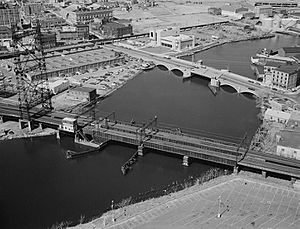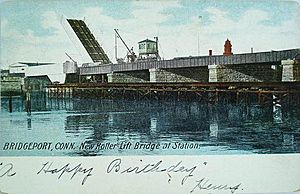Pequonnock River Railroad Bridge facts for kids
Quick facts for kids Pequonnock River Railroad Bridge |
|
|---|---|

Pequonnock River Railroad Bridge in 1977
|
|
| Coordinates | 41°10′59″N 73°11′11″W / 41.18306°N 73.18639°W |
| Carries | Metro North New Haven Line Amtrak |
| Crosses | Pequonnock River |
| Locale | Grand Street, Bridgeport (Connecticut) |
| Official name | Pequonnock River Railroad Bridge |
| Characteristics | |
| Design | Bascule bridge |
| Total length | 372.1 feet (113.4 m) |
| Width | 35.1 feet (10.7 m) |
| History | |
| Opened | 1998 |
The Pequonnock River Railroad Bridge is a special kind of bridge called a drawbridge in Bridgeport, Connecticut. It crosses over the Pequonnock River. This bridge is super important because it carries trains from Metro-North, Amtrak, and even freight trains.
You might hear it called by other names too, like Pequonnock River Bridge or PECK Bridge. It's a key part of the Northeast Corridor train line, which connects many cities along the East Coast.
Contents
A Look Back: The Old Bridge
The bridge you see today isn't the first one in this spot! An older bridge was built between 1898 and 1902. It was a "bascule bridge," which means it could lift up to let boats pass underneath.
This old bridge was designed to have two train tracks. Later, in the 1960s, it was expanded to carry up to four tracks. It was one of several similar movable bridges built around that time along the train route in Connecticut.
In 1987, the old bridge was even added to the National Register of Historic Places. This is a list of places important to American history. However, even though it was historic, the bridge was already getting old and worn out.
Why a New Bridge Was Needed
By the late 1970s and early 1980s, the old bridge was in really bad shape. It was rusting, the metal was tired from years of use, and strong river currents were causing problems.
In 1986, inspectors found that the part of the bridge that lifted up was moving too much from side to side. This was dangerous! To keep trains safe, they had to slow down to just 10 miles per hour when crossing the bridge. Lots of repairs were done to keep it working, but everyone knew a brand new bridge was the only real solution.
In 1992, the US government gave $80 million to help build a replacement bridge. This was a huge step towards getting a safer, more modern bridge.
Building the New Bridge
Building the new Pequonnock River Railroad Bridge was a big project that started in 1993. To make sure trains and boats could still use the area, the construction was done in three main steps.
Phase 1: The South Span Opens
The first step involved getting the land ready around the bridge. Then, workers built the south side of the new bridge. This part had two tracks for trains. It opened for train traffic in early 1995.
Phase 2: The North Span Arrives
After the new south span was ready, the old south part of the bridge was taken down. In its place, the new north side of the bridge was built. This section also had two train tracks. The new north span opened for trains in late 1996.
Phase 3: Finishing Touches
The final step involved removing the rest of the old bridge structure. Workers also did more construction on the new bridge's two sides and made some small improvements to the area around it. This last phase was finished in early 1998. Soon after, the train companies announced that the entire bridge replacement project was complete!
What's Special About the New Bridge?
The new Pequonnock River Railroad Bridge is much better than the old one. It has more space for boats to pass underneath. When the bridge is closed, boats have 105 feet of horizontal space and 20 feet of vertical space. This means two boats can sometimes pass at the same time!
Another cool thing is that the new bridge has a special deck that makes less noise when trains go over it. It also makes it easier for workers to take care of the bridge and the train tracks. Plus, the two sides of the new bridge can lift up together or separately, which makes it very flexible.
 | Toni Morrison |
 | Barack Obama |
 | Martin Luther King Jr. |
 | Ralph Bunche |


